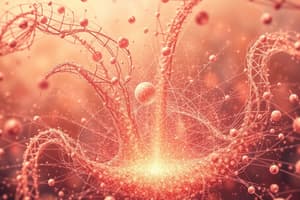Podcast
Questions and Answers
According to the kinetic theory of matter, what happens to the motion of particles with a rise in temperature?
According to the kinetic theory of matter, what happens to the motion of particles with a rise in temperature?
- The motion of the particles remains constant
- The motion of the particles increases (correct)
- The motion of the particles stops
- The motion of the particles decreases
Which phase of matter has particles with the least energy according to the kinetic theory of matter?
Which phase of matter has particles with the least energy according to the kinetic theory of matter?
- Liquid
- Solid (correct)
- Plasma
- Gas
What is the nature of the motion of particles in matter according to the kinetic theory?
What is the nature of the motion of particles in matter according to the kinetic theory?
- Non-existent
- Controlled and directed
- Periodic
- Continuous and random (correct)
Which type of energy do all particles have according to the kinetic theory of matter?
Which type of energy do all particles have according to the kinetic theory of matter?
What is the term used to describe the smallest particles that make up substances in the kinetic theory of matter?
What is the term used to describe the smallest particles that make up substances in the kinetic theory of matter?
In which state of matter do particles have the greatest amount of energy?
In which state of matter do particles have the greatest amount of energy?
Based on the kinetic theory, what is the movement behavior of particles as temperature increases?
Based on the kinetic theory, what is the movement behavior of particles as temperature increases?
What happens to the potential energy of particles as they change from solid to gas according to the kinetic theory?
What happens to the potential energy of particles as they change from solid to gas according to the kinetic theory?
What is responsible for the motion of particles in matter as described by the kinetic theory?
What is responsible for the motion of particles in matter as described by the kinetic theory?
What type of speed do particles have in matter according to the kinetic theory?
What type of speed do particles have in matter according to the kinetic theory?
Flashcards are hidden until you start studying




